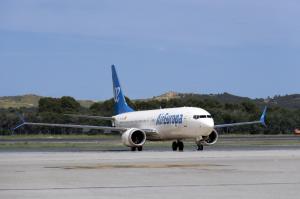Air Europa Welcomes Its First Boeing 737 MAX, Accelerating Sustainable Fleet Renewal
The airline introduces the 737-8, cutting fuel consumption and emissions by 20% while enhancing passenger comfort and operational efficiency
NEW YORK, NY, UNITED STATES, July 17, 2025 /EINPresswire.com/ -- Air Europa has taken delivery of its first Boeing 737 MAX 8, marking a significant milestone in its fleet modernization strategy and reinforcing its role as a key connector between Europe and the Americas.With this addition, the airline becomes the first Spanish carrier to operate the Boeing 737-8, one of the most advanced and efficient single-aisle aircraft in the aviation industry.
This aircraft is the first of four units scheduled for delivery in 2025 under a leasing agreement with AerCap, the world’s largest aircraft lessor. An additional ten units will join the fleet in 2026, bringing the total number of 737 MAX aircraft to twenty by mid-2027.
These aircraft will primarily serve short- and medium-haul routes across Europe, while also supporting key connections that strengthen Air Europa’s transatlantic network.
Driving sustainability on a global scale
The Boeing 737 MAX 8 delivers up to 20% lower fuel consumption and CO₂ emissions compared to the previous generation. It is expected to avoid the release of 3.6 million tons of CO₂ annually, contributing to Air Europa’s goal of reducing its carbon footprint by 30% by 2030, in line with global aviation decarbonization targets.
Equipped with state-of-the-art LEAP-1B engines and an optimized aerodynamic design, the MAX 8 also incorporates advanced navigation systems to improve flight efficiency. Additionally, it reduces noise pollution by 50% during takeoff and landing at key hubs such as Madrid and Palma de Mallorca, meeting the most stringent international standards.
Enhanced passenger experience
The new aircraft also elevates onboard comfort with:
20% larger windows, offering more natural light.
Dynamic LED lighting, designed to match different phases of the flight.
Larger overhead bins and a redesigned, lighter cabin that accommodates up to 189 passengers.
"The arrival of this aircraft marks a new chapter for Air Europa. We are not only modernizing our fleet but also advancing toward a more sustainable and efficient operation, delivering benefits for both our passengers and the environment," said Juan José Hidalgo, Chairman of Air Europa.
From Boeing, Ricardo Cavero, Vice President of Commercial Sales & Marketing for Europe and Israel, added:
"The delivery of Air Europa’s first 737 MAX supports its growth strategy and commitment to decarbonization. This aircraft reduces fuel consumption, emissions, and noise, enhancing the airline’s operations at major hubs like Madrid and Palma de Mallorca."
Aengus Kelly, CEO of AerCap, also highlighted:
"It’s an important milestone for Air Europa to become Spain’s first 737 MAX operator. We are proud to support their fleet modernization with one of the most fuel-efficient and sustainable aircraft in the market, and we look forward to continuing this partnership in the years ahead."
Corporate Communications Department
Air Europa
+ +34 911 401 501
comunicacion@globalia.com
Legal Disclaimer:
EIN Presswire provides this news content "as is" without warranty of any kind. We do not accept any responsibility or liability for the accuracy, content, images, videos, licenses, completeness, legality, or reliability of the information contained in this article. If you have any complaints or copyright issues related to this article, kindly contact the author above.
Voltage Transformer Market to Surpass $42.1 Billion by 2032, Driven by Renewables & Smart Grid Integration
viveEV’s 600 kW Ultra Slim and Tron DC Chargers Certified to U.S. Safety Standards by TÜV Rheinland (NRTL)
Unlocking Global Potential in the Industrial Flooring Market: Strategic Insights for 2024–2033
Kalendarium
Więcej ważnych informacji
 Jedynka Newserii
Jedynka Newserii

 Jedynka Newserii
Jedynka Newserii

Prawo

KE proponuje nowy Fundusz Konkurencyjności. Ma pobudzić inwestycje w strategiczne dla Europy technologie
W środę 16 lipca Komisja Europejska przedstawiła projekt budżetu na lata 2028–2034. Jedna z propozycji zakłada utworzenie Europejskiego Funduszu Konkurencyjności o wartości ponad 400 mld euro, który ma pobudzić inwestycje w technologie strategiczne dla jednolitego rynku. Wśród wspieranych obszarów znalazła się obronność i przestrzeń kosmiczna. Na ten cel ma trafić ponad 130 mld euro, pięciokrotnie więcej niż do tej pory.
Firma
Były prezes PGE: OZE potrzebuje wsparcia magazynów energii. To temat traktowany po macoszemu

Choć udział odnawialnych źródeł energii w miksie energetycznym Polski jest stosunkowo wysoki i rośnie, to ten przyrost jest chaotyczny i nierównomiernie rozłożony miedzy technologiami – wskazuje Forum Energii. Dodatkowo OZE potrzebują wsparcia magazynów energii, a zdaniem Wojciecha Dąbrowskiego, prezesa Fundacji SET, ten temat jest traktowany po macoszemu. Brak magazynów powoduje, że produkcja energii z OZE jest tymczasowo wyłączana, co oznacza marnowanie potencjału tych źródeł.
Infrastruktura
Wzrost wynagrodzeń ekip budowlanych najmocniej wpływa na koszty budowy domu. Zainteresowanie inwestorów mimo to nieznacznie wzrasta

Budowa metra kwadratowego domu w Polsce kosztuje od 5,55 do 6 tys. zł w zależności od województwa – wynika z najnowszych analiz firmy Sekocenbud. Najdrożej jest w Warszawie, gdzie cena za metr kwadratowy domu przekroczyła już 6,2 tys. zł. Na przyrosty kosztów budowy domu wpływają zarówno drożejące materiały budowlane, jak i wyższe wynagrodzenia pracowników. Inwestorzy nie rezygnują jednak z budowy domów jednorodzinnych, co ma związek m.in. z wciąż wysokimi cenami mieszkań czy też obniżką stóp procentowych.
Partner serwisu
Szkolenia

Akademia Newserii
Akademia Newserii to projekt, w ramach którego najlepsi polscy dziennikarze biznesowi, giełdowi oraz lifestylowi, a także szkoleniowcy z wieloletnim doświadczeniem dzielą się swoją wiedzą nt. pracy z mediami.









.gif)

 |
| |
| |
|